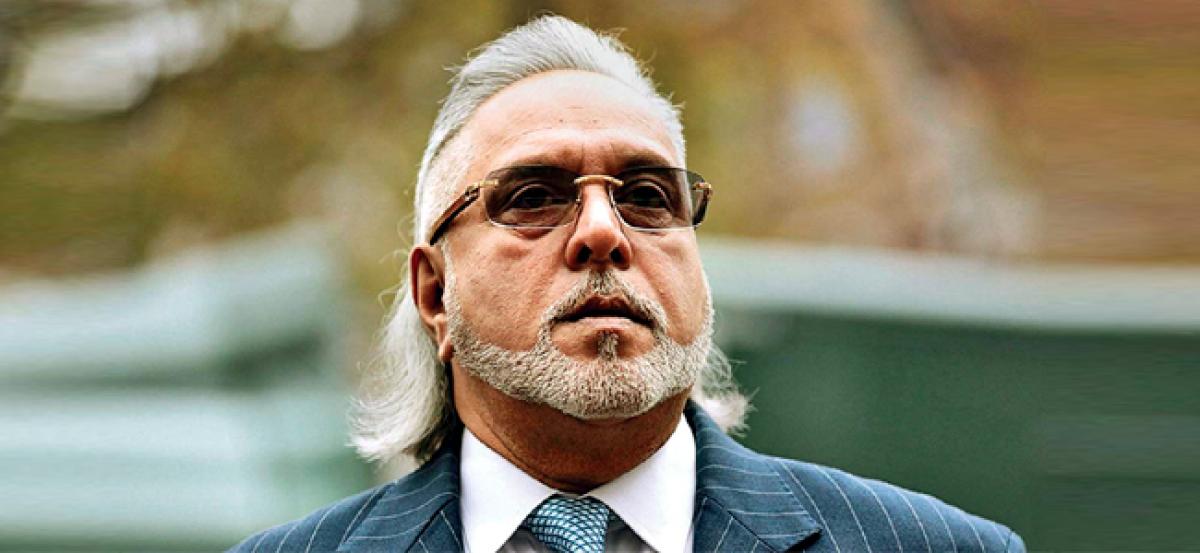Live
- Are strict laws needed to ensure MLAs attend Assembly sessions?
- Trekking above 3K metres in Kangra temporarily banned
- Protest in Hamirpur over closure of charitable hospital
- Vaishno Devi ropeway row: Two detained in fresh protest, FIR against 8
- Ensure food items served to students are not contaminated: Collector
- Jhansi medical college fire: UP govt removes principal, suspends 3 staff members
- Student hangs self at Gurukulam
- Centre releases funds to AP for tourism development
- 4 Maoists held, explosives seized in Chhattisgarh
- IIT Delhi student killed in soil collapse in Guj
Just In
Mallya tagged as Fugitive Offender. Under the New law as Enforcement Directorate (ED)


On Friday India made its first official move against the big bank loan defaulters to bring them down. Under a new law as the Enforcement Directorate (ED) moved a court against liquor baron Vijay Mallya seeking to declare him as a \'fugitive offender\' and to confiscate his assets worth Rs 12,500 crore.
NEW DELHI: On Friday India made its first official move against the big bank loan defaulters to bring them down. Under a new law as the Enforcement Directorate (ED) moved a court against liquor baron Vijay Mallya seeking to declare him as a 'fugitive offender' and to confiscate his assets worth Rs 12,500 crore.
Officials said that the agency filed an application before at the Mumbai court under the recently emerged Fugitive Economic Offenders Ordinance that empowers it to confiscate all the assets of an absconding loan defaulter.
The ED has found evidences in its two charge sheets, filed under the Prevention of Money Laundering Act (PMLA) in the past, to make a case for seeking a fugitive offender tag for Mallya from the court.
Mallya is contesting these money laundering charges in London as part of India's efforts to extradite him from there and face the legal system here in connection with an overall alleged loan default of over Rs 9,000 crore of various banks.
As per the existing process of law under the PMLA, the ED can confiscate the assets only after the trial in a case finishes which usually takes many years.
The Modi government brought the fugitive ordinance into practice as "there have been instances of economic offenders fleeing the jurisdiction of Indian courts, anticipating the commencement, or during the pendency, of criminal proceedings," the government said.
The Fugitive Economic Offenders Bill, 2018 was introduced in the Lok Sabha on March 12 but couldn't be taken up due to logjam in Parliament over other different issues. With Parliament being adjourned sine die, an ordinance was proposed.
The Union Cabinet on April 21 approved the ordinance and the President gave his assent to promulgation of the same a day later.
"A Fugitive Economic Offender is a person against whom an arrest warrant has been issued in respect of a scheduled offence and who has left India so as to avoid criminal prosecution, or being abroad, refuses to return to India to face criminal prosecution," the government said.
Cases of frauds, cheque dishonour or loan default of over the amount of Rs 100 crore would come under the ambit of this ordinance.
The ordinance provides necessary constitutional safeguards in terms of providing hearing to the person through counsel, allowing him time to file a reply, serving notice of summons to him, whether in India or abroad and appeal before the high court.

© 2024 Hyderabad Media House Limited/The Hans India. All rights reserved. Powered by hocalwire.com






